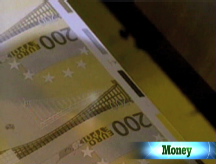Dollar continues its slide
Investors see more U.S. financial sector weakness as outlook in Europe and Japan improves.
NEW YORK (CNNMoney.com) -- The dollar declined Tuesday as stronger-than-expected economic reports from Japan and Germany strengthened overseas currencies, amid further concerns about write-offs in the financial sector in the United States.
The 15-nation euro rose Tuesday to $1.5791 from $1.5757 a day earlier. The dollar also fell against the yen, to ¥106.01 from ¥106.10.
In Japan, the Tankan survey of business sentiment by the Bank of Japan remained negative, but came in higher than analysts had expected.
Meanwhile a report from Germany's Federal Statistics Office showed that retail sales in the euro-zone's largest economy rose in May, also above expectations.
In spite of the strengthening of foreign currencies, "it really is a story about dollar weakness," said Dustin Reid, senior currency strategist with ABN AMRO.
The yen in particular was being purchased as a safe haven against weakness in other currencies, he added.
Write-offs on deck
Investors were a concerned about another round of write-offs by U.S. financial companies, said Reid.
While investors weren't expecting another financial sector explosion such as the first-quarter near-collapse of Bear Stearns (BSC, Fortune 500), they remained wary of more big credit market losses.
Shares of Lehman Brothers (LEH, Fortune 500) tumbled 11% Monday amid rumors that credit market-related problems may force it to sell off some or all of its business holdings.
Financial services firms in the S&P 500 are expected to report a 60% decline in net income in the second quarter from a year ago, according to Thomson Reuters.
"It appears that the worst hasn't been seen just yet," said Gareth Sylvester, senior currency strategist with HFIX in San Francisco.
Inflation
The lack of inflation-related news may also mean the Federal Reserve may not be as aggressive in combating inflation as its European counterpart, he added.
The European Central Bank was set to meet Thursday, and was widely expected to raise its interbank lending rate to strengthen the euro. A strengthening of the euro would have the same effect as a Federal Reserve rate decrease, which would weaken the dollar when compared to the European currency. ![]()


